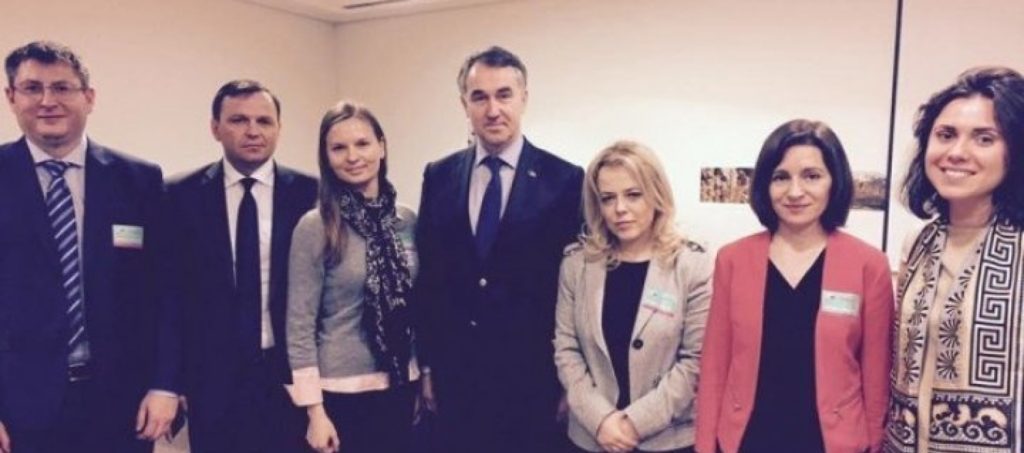An European foundation is accused of involvement in the domestic affairs of the Republic of Moldova. Two opposition parties could be fined or even excluded from the parliamentary elections in February next year. Lately, the public opinion in our country has been flooded with various contradictory information on this subject. In order to bring to light details about this case, Moldova.org will try to come up with relevant clarifications and conclusions.
n October 2016, the politically affiliated media published and advertised a video documentary named “The Devil’s Advocate”, where Ana Ursachi, the lawyer of several opposition political leaders and activists, was alleged to commit a murder in 1997.
Her ex-husband, Ruslan Moiseev, was sentenced to 18 years in prison and has been already released. Ursachi was acquitted after the court found insufficient evidence against her.
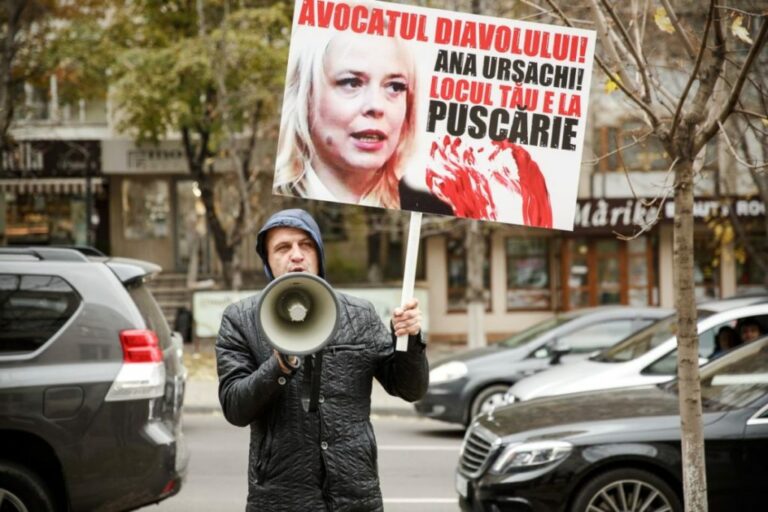
Even though, according to Article 287 of the Criminal Procedure Code, paragraph 4, “the prosecution can be resumed not later than one year after the stay of proceedings came into effect”, in October 2016, the prosecutors requested to restart the prosecution of the already closed in 1997 criminal case against Ana Ursachi – so, 19 years later. Prosecutors justify this abuse by the severity of the case, which would allow certain exceptions, including perquisitions at Ana Ursachi’s home, even in her and her lawyer’s absence. As the lawyer defended some politicians and businessmen that are opponents of Vladimir Plahotniuc, such as Grigore Petrenco, Alexandru Machedon, Domnica Manole, Ion Butmalai, Renato Usatii, Veaceslav Platon, Viorel Topa and others, there are suspicions that this case would represent a political order.
Here is where Open Dialog Foundation came on stage. It qualifies the case as an abuse of power, a political fight with the opponents.
The Open Dialog Foundation
The Open Dialogue Foundation was established in Poland in 2009 at the initiative of Ludmila Kozlovska, the current president of the Foundation. The Foundation’s statutory objectives include the protection of human rights, democracy and the rule of law in the post-Soviet space.
For achieving these objectives, the Foundation organizes observation missions, monitors elections and the human rights situation in the post-Soviet space. Based on these activities, the Foundation creates reports and distributes them to the EU institutions, the OSCE and other international organizations, as well as to the ministries of foreign affairs and parliaments of the EU countries, analytical and media centers.
source: odfoundation.eu
At the end of August, the information that the Open Dialog Foundation would have financed the PAS and DTPP leaders’ participation at a conference dedicated to human rights and the political situation in the Republic of Moldova appeared in the Moldovan media. As evidence, pictures from the event were presented, as well as electronic invitations for the president of the Party of Action and Solidarity, Maia Sandu, the president of the Truth and Dignity Platform Party, Andrei Nastase, the journalist Natalia Morari, the lawyer Ana Ursachi and for the businessman Alexander Machedon. The invitation was made on behalf of the Open Dialogue Foundation and from the MEPs Anna Fotyga, Ramona Nicole Mănescu, Renate Weber and Rebecca Harms. The invitation was signed by Ludmila Kozlovska, the president of the Open Dialogue Foundation.
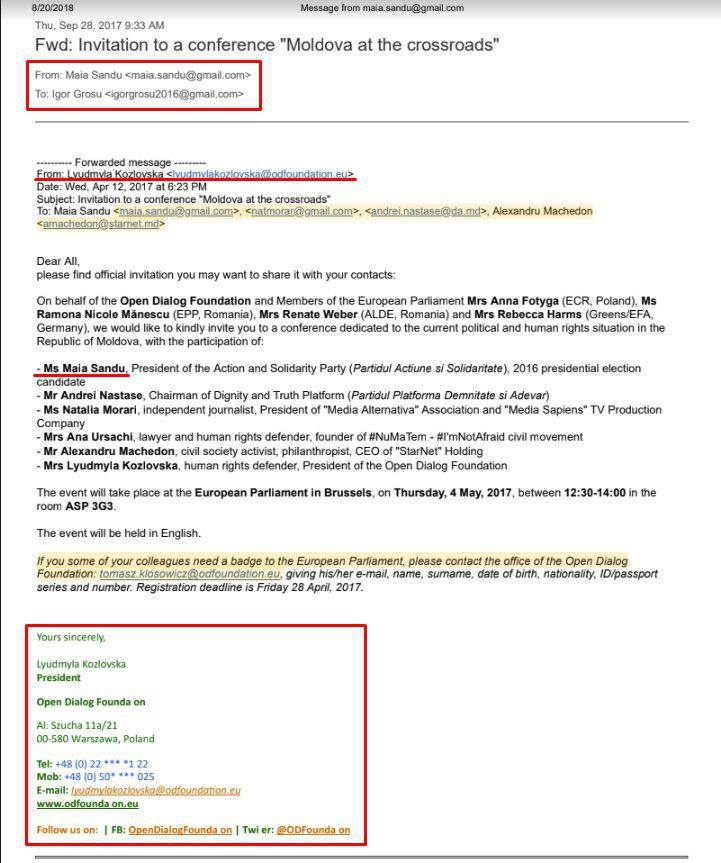
On October 4th this year, the Parliament of the Republic of Moldova established an Investigation Commission to elucidate the circumstances of the interference of the Open Dialogue Foundation and its founder, Ludmila Kozlovska, in the internal affairs of the Republic of Moldova, as well as the circumstances of financing some political parties.
“There are interconnections of this NGO with some persons having a dubious reputation that finance such organizations. This money reaches the political organizations of the Republic of Moldova afterwards. They buy airline tickets with it, pay accommodation at the hotel, food in restaurants …”
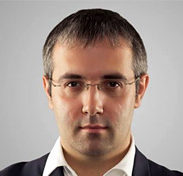
Sergiu Sîrbu
deputy, PDM representative
In the same time, Maia Sandu and Ludmila Kozlovska confirmed that their visit was financed by the Open Dialog Foundation.
“The Open Dialog funded my trip there along with the other guests from Moldova. I also participated in other events. Moreover, the representatives of the Democratic Party of Moldova participated at events organized by different international foundations. This has never been interpreted as a misconduct.”
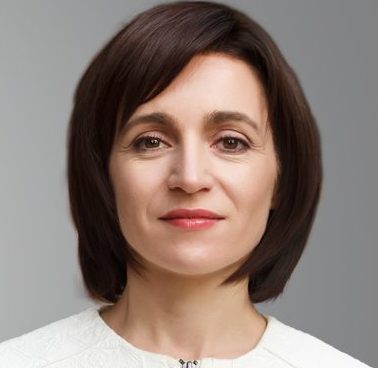
Maia Sandu
PAS president
“It’s an absolutely normal practice. We, as an organization that defends human rights, have the right to invite any speaker. We even sometimes invite the representatives of the government in order to ensure a dialogue between the opposition, civil society and the government.”
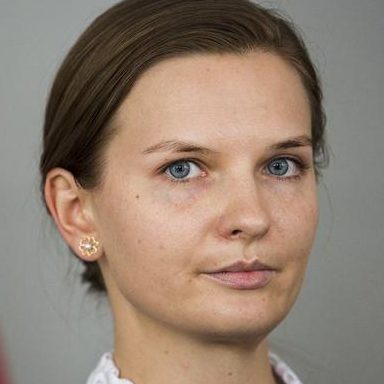
Lyudmila Kozlovska
Open Dialog Foundation’s President
However, the law is categorical on this subject. Article 26, paragraph 6, letter “g” of the Law no. 294 of 21 December 2007 on political parties says:
“The financing, the provision of free services or the material support in any form, direct and/ or indirect, of political parties by other states and international organizations, including international political organizations, shall be prohibited”.
To this regard, the Promo-LEX Association came up with an informative note on the Parliament’s decision on the establishment of the Commission of Inquiry, recommending that the travel abroad be exempt from the ban on financing, this type of financing does not unfair competition conditions of the other political parties, does not interfere with independence and transparency and can not be the object of corruption.
“From our point of view, the absolute prohibition in Moldova’s legislation is too restrictive and in this way limits the activity of political parties. I’ll bring simple examples. We have parties that are part of international party organizations: the European People’s Party, the Socialist International, etc. And when these international political organizations finance, for example, the participation of a member of the Party of the Republic of Moldova in an international event, for example, the annual conference, but they pay for transport, accommodation, subsistence, etc., this in a way , in accordance with the legislation of the Republic of Moldova, is an illegal one, because it is an external, indirect financing of the political party. The delegate goes for political purposes there, to represent his party. The same can be applied to different foundations and non-commercial organizations.”
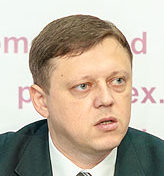
Pavel Postică
Promo-LEX Program Director “Monitoring Democracy Processes
Together with Promo-LEX experts, the parliamentary opposition criticized the Commission’s tendency and accusation. They accuse the project’s authors of lack of impartiality and fairness.
“What you do not say is that this is an action against the opposition. Call it like it is! ”
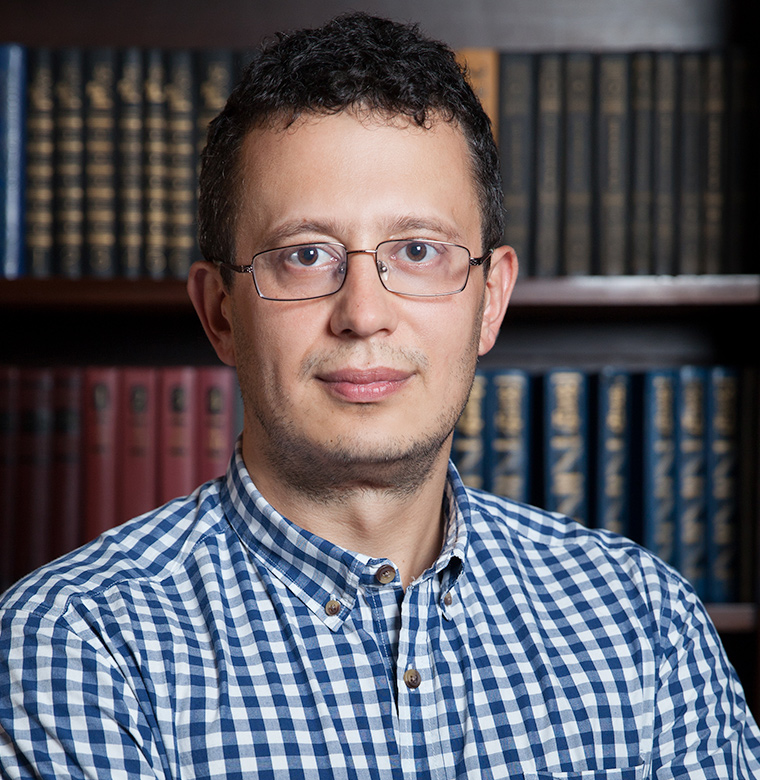
Vadim Pistrinciuc
PLDM representative
“Mr. Sîrbu tried to come up with the Commission’s conclusions, even if the Commission is not created.”
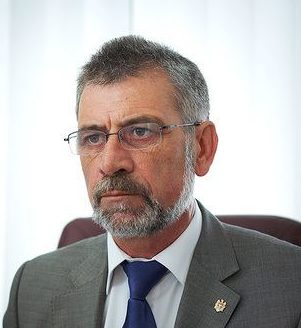
Tudor Deliu
PLDM representative
Besides the funding of the opposition leaders’ trip to Bruxelles, the Parliament discussed about a greater funding of the opposition parties in the Republic of Moldova by the Open Dialogue foundation.
“It’s a fake! The Action and Solidarity Party is legally funded, and the law says all sources of funding must be within the country. PAS has never received any money from this foundation. ”

Maia Sandu
PAS president
All the reports of the Party of Action and Solidarity are published on the party’s and the Central Electoral Comision’s website. Thus, no funding from abroad is presented, which excludes the “Dialog Deschis (Open Dialogue)” foundation as well.
Nevertheless, Pavel Postică, the director of Promo-lex Program “Democratic Processes Monitoring” claims no cases in which any of the political parties from the Republic of Moldova have officially declared their whole income.
“We have checked a lot of parties, first of all Șor’s Party, the Democratic Party, the Socialist Party…They have the greatest unreported costs. From transport costs, public events organizing costs, telecommunication costs, abroad trip costs, etc. Other parties additionally, including the DTPP, PAS party, Communists party, the Liberals, Our Party… We have also confirmed the parties with unreported costs. There is no party to have candidly declared their whole income. We have no such ascertainments.”

Pavel Postică
director of Promo-lex Program “Democratic Processes Monitoring
„Edelweiss”, which belongs to the Democratic Party president, “Din suflet” – another foundation… There are a many more… Or the political party’s social stores, these are serious slips, serious mistakes. This is the logic I don’t understand.”

Iurie Țap
PLDM representative
„You have talked about the illegal funding of political parties, about oligarchs, about the billion theft, foreign money, questionable money, a Republic of Moldova Messiah and you give me the impression that you have been talking about your colleague from Orhei. Or, when we talk about the illegal funding of political parties, there have been other suggestions in this case, and every time you have rejected them.”
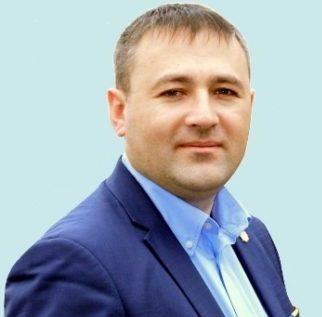
Roman Boțan
PL representative
International press, however, often accuses the Open Dialogue Foundation to actually be a lobby organisation, which, for a honorarium, would “wash a dubious person’s image”. After the foundation encouraged punitive actions towards the governance of the Republic of Moldova, and more recently, personal sanctions for Vladimir Plahotniuc, such accusations have increased in our country’s media space as well. These are also supported by the parliamentary majority.
„When talking about “Open Dialog” and we are talking about the Kazakh oligarch which has funded and still funds this organization, Ablyazov… Well, this is a big question mark. And if we are still talking about the fight against oligarchy, we would like to see how to fight against it. By using another fugitive oligarch’s money?”
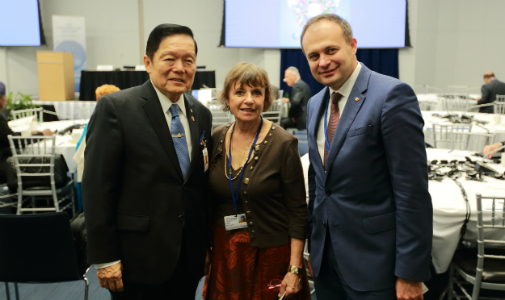
Andrian Candu
president of the Republic of Moldova parliament:
Mukhtar Ablyazov
Mukhtar Ablyazov, born May 16th 1963, is a politician, businessman and Kazakh banker, accused of a 6 billion fund embezzlement while being the president of the BTA bank in Kazakhstan. This fraud is also known as the greatest banking fraud of all times.
Mukhtar Ablyazov is the founder of the „Democratic Choice of Kazakhstan (DCK)” party, which stands in opposition to the Kazakh president Nursultan Nazarbaiev. The party was disbanded in 2005.
Source: wikipedia.org
In september 2017, “Financial Times” magazine published an investigation, where the oligarch Ablyazov’s activity is thoroughly described. He was one of the loyal funders of Nursultan Nazarbaev’s regime, Kazakhstan’s president since 1989. In 1998, Nazarbaiev appoints Ablyazov as Energetics, Industry, and Commerce Minister in the Kazakh government. Over time, however, Nazarbaev claims to be given nominal control over 50% of BTA’s shares, a claim that Ablyazov would have refused. Amid the conflict between the two of them, in October 1999, Mukhtar Ablyazov is dismissed from his minister seat and subjected to an investigation of position abuse, embezzlement of public funds, concealing of properties, intentional bankruptcy of certain companies and the creation of a organized criminal group.
In 2009, understanding that the bank’s nationalization is inevitable and being pressed in criminal cases in Kazakhstan, Ukraine and Russia where he was targeted for bank scams and money laundering, Ablyazov runs away from Moscow to London, where he receives political refugee status. Ablyazov withdrew a sum of about $6 billion from his bank and took it with him to the UK. He claims to be the sacrificial pawn of a political quarrel, and he uses financial tricks not to illegally gain wealth, but also to protect them from such frauds.
In 2012, however, Mukhtar Ablyazov was sentenced by the British Supreme Court to 22 months in prison for lying to investigative bodies on the scale of the sale of property, including a 17 million-pound mansion located on “The Bishops Avenue,” and for the “serious and brutal” contempt of the court in an attempt to hide more than 34 million pounds of assets. In October this year, the UK decided to withdraw the asylum granted to Muhtar Ablyazov.
In October 2010, the Tver District Court in Russia ordered Ablyazov’s preventive arrest in criminal prosecution on large-scale scams, abuse of trust, falsification of official documents, and the organization of a criminal group. Based on this decision, in September 2015, Prime Minister Manuel Valls signs a decree satisfying the Russian request to extradite Mukhtar Ablyazov to the Russian Federation. However, in December 2016, the French Council of State annulled the Prime Minister’s decree, arguing that the request for extradition would be based on political reasons, and required the French State to pay Ablyazov a compensation of 3,000 euros.
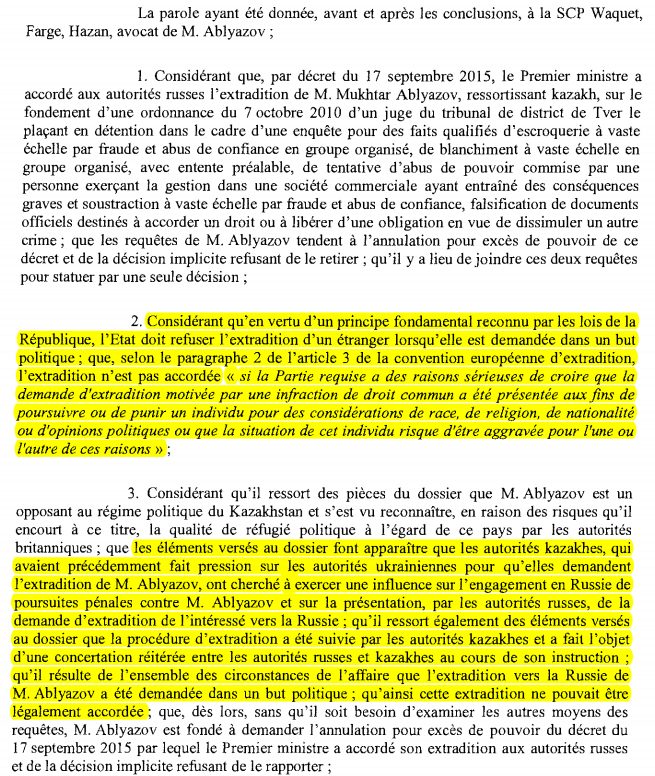
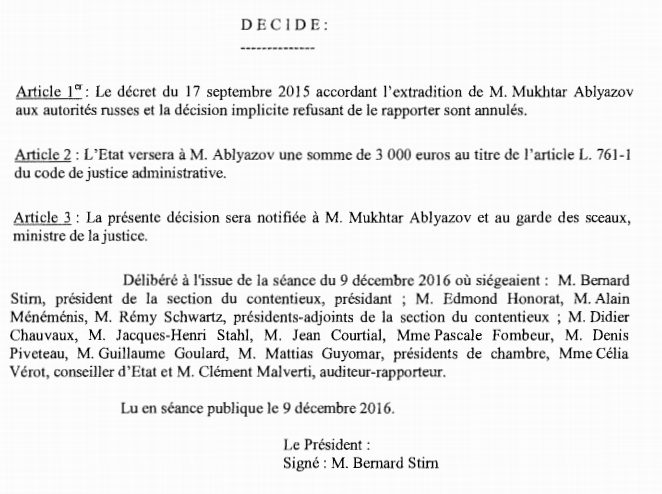
The “Open Dialogue” Foundation came to defend Ablyazov, the main opponent of Kazakh President Nursultan Nazarbaev. The Foundation’s representatives qualify Ablyazov as a victim of a political upheaval.
The Open Dialogue Foundation recognizes the discrediting campaign against Mukhtar Ablyazov as further proof that the Kazakh opposition is being persecuted. […] False accusations against the political dissident are political in nature and their purpose is to remove political opponent Mukhtar Ablyazov.
“Indeed, Mukhtar Ablyazov has been pursued for many years by the Kazakh government and personally by President Nazarbaev, who has remained unchanged for more than 30 years in Kazakhstan. For us, Muhtar Ablyazov is one of the hundreds of victims of the political upheaval. His wife and six-year-old daughter, who in 2013 were kidnapped in Italy by the diplomats of the Kazakh embassy, were persecuted. This is where our foundation has been actively involved in protecting Ablyazov’s family. As a result, Mukhtar Ablyazov, on the basis of a request for extradition and search in Interpol from Russia and Ukraine, which we qualify as political and inspired by Kazakh officials, has been imprisoned for three and a half years. ”

Ludmila Kozlovska
The Open Dialogue Foundation’s president
The opponents of the Open Dialogue Foundation insinuate that it has received considerable Ablyazov’s honors for its “lobbying” services. Foundation chairperson Ludmila Kozlovska responds ironically to these insinuations …
We are not against of being funded. When that happens, no matter if Soros or Ablyazov will support us, we won’t be against. Unfortunately, this has not happened yet. “
According to the Foundation’s financial reports, the name “Ablyazov” is not on the list of donors. However, during the period 2013-2016, Ludmila Kozlovska donated over 33,800 zlotys to its own foundation, equivalent to about 7,900 euros according to the current course. His husband, Bartosz Kramek, contributed more than 315 thousand zlotys or about 73 thousand euros. The brothers of Bartosz, Paweł and Mateusz donated together 40,000 zlotys for three years or the equivalent of approximately 9,300 euros. The most contributed Petro Kozlovski, with more than 1.5 million zlotys, the equivalent of about 350,000 euros according to the current exchange course.
Petro Kozlovski, brother of Ludmila Kozlovska, is a Ukrainian businessman from Sevastopol. He currently lives in the United States of America. He held the industrial complex “Mayak”, as well as other companies operating in Sevastopol and Crimea. Petro Kozlovski also conducts activities in the field of telecommunications. Since 2004, she has been involved in supporting the Orange Revolution and other Ukrainian initiatives in the Crimea. Just like other Ukrainian businesses, in 2014, Petro Kozlovski’s business was taken over by the Russian occupation authorities. Crimean Russian media accuses him of being the supporter of Stepan Bandera and the Ukrainian Batkivsina party.
However, opponents of the Open Dialogue Foundation allude to the fact that the money donated by the members of the Ludmila Kozlovska family would actually be the money of the oligarch Kazakh Ablyazov.
“My brother is a businessman. He never hid it. The money was donated long before we got involved in the “Ablyazov” case. I never hid this. Everything is described in our reports, which have been published for years on our website. All this information has always been available. My family members supported me because they were primarily interested in preserving Ukraine’s independence. Very many businessmen supported us at that time as much as they could, including our family members.”

Ludmila Kozlovska
The Open Dialog Foundation’s president
Another “dubious” donor of the Open Dialogue Foundation, according to the report of the Parliamentary Commission, is Veaceslav Platon. From a confidential scheme in this report, which has yet to be made public, it appears that a group of companies belonging to Veaceslav Platon paid the Foundation about $ 2 million. The source of money would be money laundering and fraud.
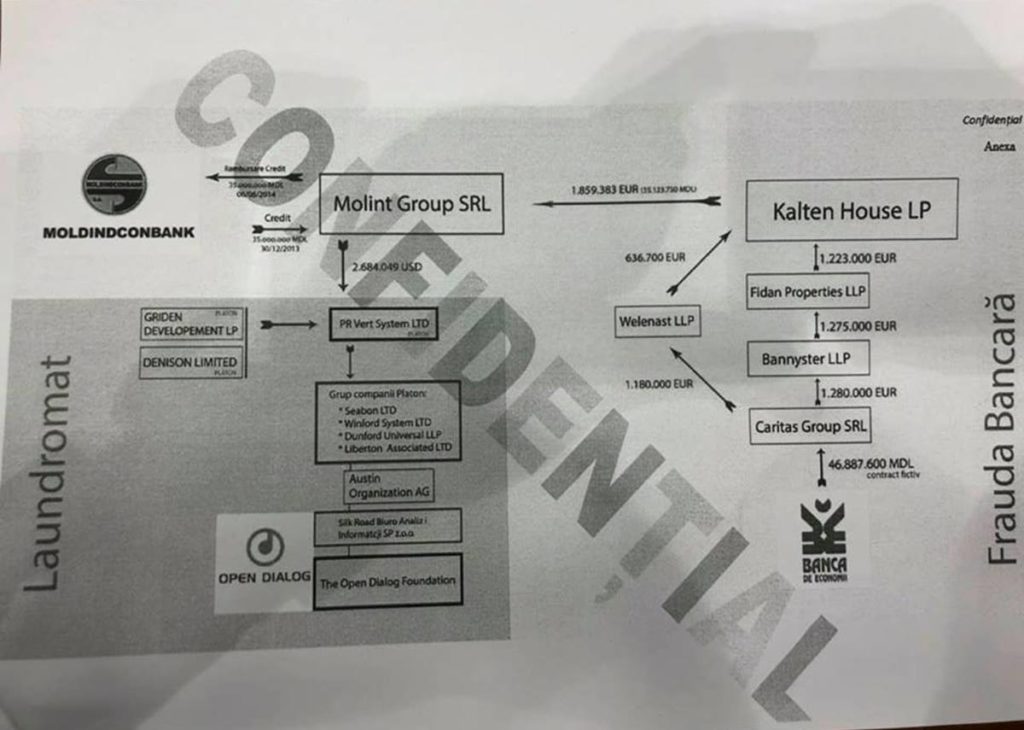
“Today is easy to draw arrows and say one is related to another. I understand that to Plahotniuc’s propaganda it is convenient to discredit us, but you can not go against evidence or rewrite history. They can say anything, but we have very harsh arguments. ”

Ludmila Kozlovska
Open Dialog Foundation’s president
Indeed, for the time being, no bill, bank statement, video or any other evidence that would confirm receipt of money by the Open Dialogue Foundation has been presented outside this scheme. But the scheme was immediately distributed by the loyal press to the Chişinău government, along with other serious accusations, that Ludmila Kozlovska would have been expelled from the European Union for links with Russian special services.
“I was included in the black list of the Shengen Information System by the Polish government for the civic activism of my husband, who is a citizen of Poland and who opted for the defense of the Constitution and the State of Right.”

Ludmila Kozlovska
Open Dialog Foundation’s president
In the summer of the previous year, Bartosz Kramek, the husband of Ludmila Kozlovska, signs a text titled “Let the State end. Disconnect the Government“, referring to the current government in Poland. Using aggressive language, he harshly criticizes the work of the “Law and Justice” party in Poland. This has dissatisfied Ana Fotyga, a deputy in the European Parliament and one of the MEPs who, together with the Open Dialogue Foundation, organized two months earlier the scandalous move of the Moldovan delegation to Brussels. In response, Ana Fotyga writes a critical letter to the Open Dialogue Foundation without knowing that in less than a year it would be used as a weapon against the political opposition in the Republic of Moldova.
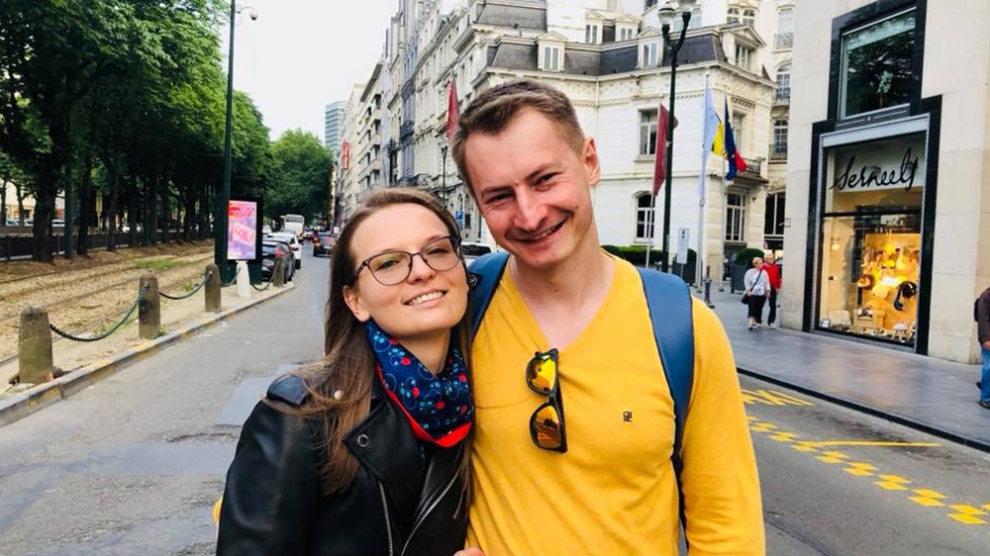
With obvious inconvenience, I became acquainted with the scandalous text signed by Bartosz Kramek, the head of the Open Dialog Foundation’s board, “Let the State end: Disconnecting the Government!” Promoted by the Foundation itself. The theses formulated, the language of hatred, but, above all, the urge to destabilize the state, indicate that the Open Dialog has ceased to be an apolitical non-governmental organization.
[…]
Taking into account the content, the purpose and the form of this disgusting manifestation, please accept my assurances that all the events and actions in which the Open Dialog Foundation will be committed, even if not insignificant, will be boycotted by me. I will also encourage them to do likewise my colleagues from other political groups as well as international partners.
Please consider this letter as the only recommendation of your activity on my part.
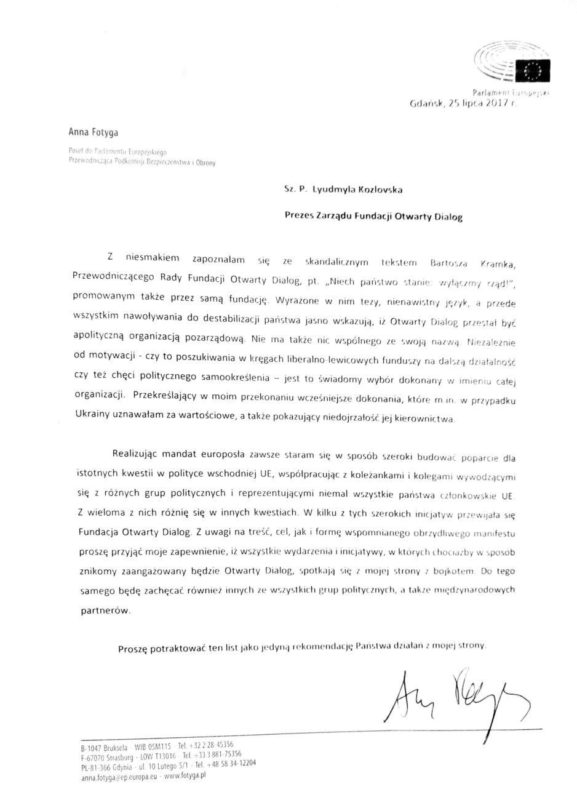
The initiators of the Parliamentary Investigation Commission of the Republic of Moldova repeatedly stressed that the “Open Dialogue” was criticized by the European institutions, and the OSCE even adopted a resolution.
In this respect, it is worth noting that it is actually a MEP, namely Ana Fotyga, who is also a member of the group of European Conservatives and Reformists, a group that includes the Polish and Polish “Law and Justice” party, criticized by Bartosz Kramek.
“The past days, there have been discussions both within the Council of Europe and in the OSCE Parliamentary Assembly … And this foundation is mentioned in these reports.”
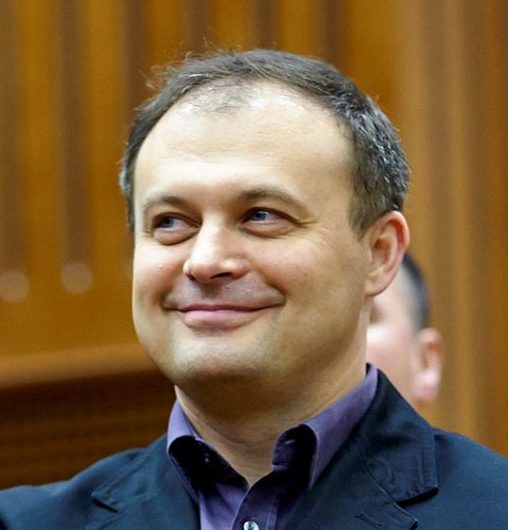
Andrian Candu
president of the Parliament of the Republic of Moldova
“On 21 September 2018, at the Warsaw conference, the OSCE called on the international community to pay increased attention to the risks associated with ODF. At the event, a statement was unanimously approved stating that organizations like ODF use dirty money … ”
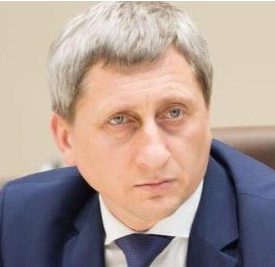
Igor Vremea
chairman of the Parliamentary Inquiry Commission for the “Open Dialogue
We asked Andrian Candu and Igor Vremea in writing to tell us which Council of Europe meeting is in question. The President of Parliament suggested that we wait for the report to be published in which these details would be present. Vremea, however, has not responded to us so far. However, we suspect that the members refer to the information in the article published on the brussels-express.eu portal, entitled “A controversial Brussels-registered human rights NGO is under scrutiny”. The author of the article writes that at the OSCE meeting held in Warsaw on September 10-21, there was a debate on “Co-operation between government and civil society in post-Soviet countries”, where the activity was analyzed and criticized Open Dialog Foundation. This article has been translated and taken over by Moldovan media institutions.
On the OSCE official website, however, we did not find any information on a so-called debate in which a “unanimous” resolution would have been voted for the “Open Dialogue” Foundation. Instead, we found the Foundation’s statement, in which its representatives expressed their concerns about the media situation in the Republic of Moldova and the political situation in our country in general. At the same OSCE event invoked by Democratic Party deputies, the Open Dialogue Foundation stated that “taking into consideration the dangers of democracy in the Republic of Moldova, the OSCE should ensure that freedom and pluralism of the media are guaranteed by taking measures concrete against the monopolization of mass media in the Republic of Moldova.”
We sent a letter to the OSCE press service with the link to the article stating that the Open Dialogue Foundation had been criticized by the OSCE, asking them to confirm or disavow this information. The answer came from the senior assistant of the OSCE Office for Democratic Institutions and Human Rights, Ireneusz Stepinski, who briefly wrote to us: “Thank you for sharing with us the article. We have no knowledge of such and event/meeting/debate during OSCE events of September 10-21, 2018. “
The same parliamentary commission of inquiry, supported by the press that is loyal to the Moldovan government, says that the Security Service of Ukraine had started an investigation on the name of Ludmila Kozlovska.
“Recently, the Ukrainian Security Service has launched an investigation against Ludmila Kozlovska on the grounds of violation of Ukrainian state unity and treason of homeland.”

Igor Vremea
PDM representative, chairman of the Parliamentary Investigation Commission in the case of “Open Dialogue”
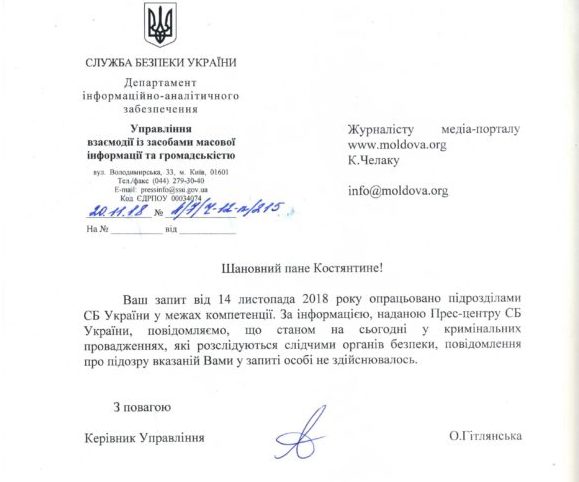
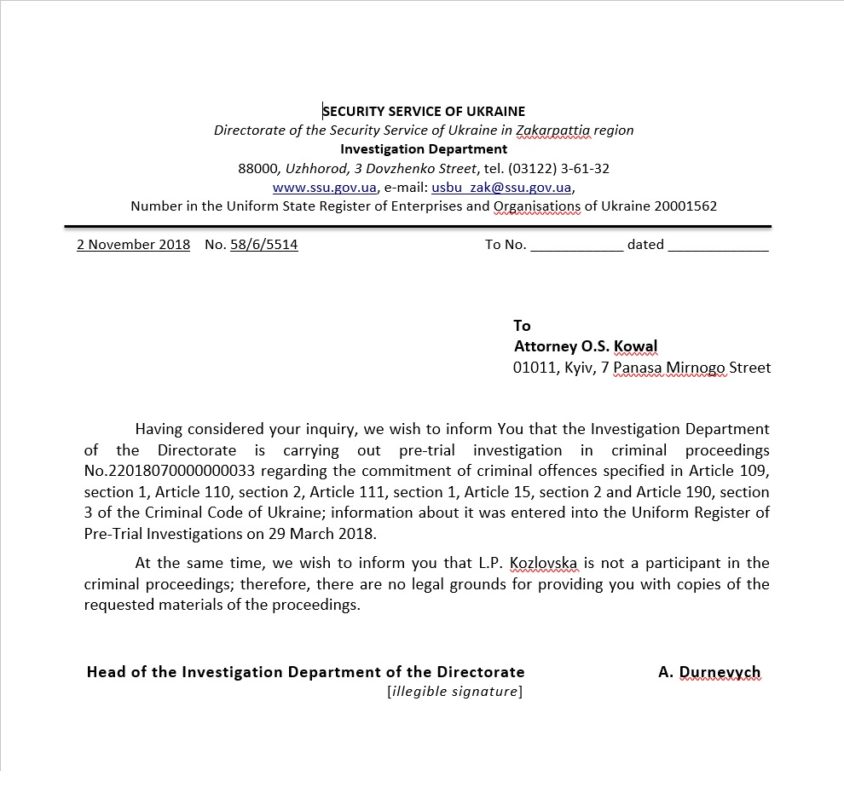
At the request of Moldova.org, the Ukrainian Security Service declared that this information is false. “According to the information provided by the Security Service Press Center of Ukraine, we inform you that until today no notification has been made regarding the suspect’s status of the person you have mentioned in the criminal proceedings investigated by the security agents.”
Let’s summarise. After a pertinent analysis of the information in the local and international press, the evidence obtained during their verification, as well as the interviewing of the persons concerned, we qualify the following information:
- The delegation to Brussels of PAS and DTPP leaders was funded by the Open Dialogue Foundation – confirmed fact.
- PAS and DTPP parties are funded by the Open Dialogue Foundation. – unconfirmed fact.
- The Open Dialog Foundation is funded by Kazakh oligarch Muhtar Ablyazov – unconfirmed fact.
- Ludmila Kozlovska and her NGO received more than 2 million US dollars from two companies belonging to the citizen Veaceslav Platon. – unconfirmed fact.
- The Open Dialogue Foundation has received a negative opinion from the Organization for Security and Co-operation in Europe (OSCE) – Proven as fake
- The Security Service of Ukraine accused Ludmila Kozlovska of betrayal of the homeland. – Proven as fake
We also qualify as rather tendentious the information that the founder of the Open Dialogue Foundation Ludmila Kozlovska was expelled from the European Union.
We believe that Poland has used its rights in the Schengen area in order to persecute the uncomfortable people. This is also confirmed by the fact that after the ban was implemented by Poland, Ludmila Kozlovska has received special visas for travel to the countries of the European Union.
The political connotations in the given case are obvious, and, furthermore, the acts of which the opposition is accused are aimed at the governing parties.
Article translated by: Andreea Bolea, Maria Dulgher and Arina Livadari


